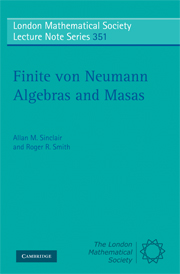Book contents
- Frontmatter
- Contents
- Preface
- 1 General introduction
- 2 Masas in B(H)
- 3 Finite von Neumann algebras
- 4 The basic construction
- 5 Projections and partial isometries
- 6 Normalisers, orthogonality and distances
- 7 The Pukánszky invariant
- 8 Operators in L∞[0, 1]⊗B(H)
- 9 Perturbations
- 10 General perturbations
- 11 Singular masas
- 12 Existence of special masas
- 13 Irreducible hyperfinite subfactors
- 14 Maximal injective subalgebras
- 15 Masas in non-separable factors
- 16 Singly generated II1 factors
- A The ultrapower and property Γ
- B Unbounded operators
- C The trace revisited
- Bibliography
- Index
- Index of symbols
5 - Projections and partial isometries
Published online by Cambridge University Press: 03 May 2010
- Frontmatter
- Contents
- Preface
- 1 General introduction
- 2 Masas in B(H)
- 3 Finite von Neumann algebras
- 4 The basic construction
- 5 Projections and partial isometries
- 6 Normalisers, orthogonality and distances
- 7 The Pukánszky invariant
- 8 Operators in L∞[0, 1]⊗B(H)
- 9 Perturbations
- 10 General perturbations
- 11 Singular masas
- 12 Existence of special masas
- 13 Irreducible hyperfinite subfactors
- 14 Maximal injective subalgebras
- 15 Masas in non-separable factors
- 16 Singly generated II1 factors
- A The ultrapower and property Γ
- B Unbounded operators
- C The trace revisited
- Bibliography
- Index
- Index of symbols
Summary
Introduction
In this chapter we consider various useful technical results concerning projections, partial isometries and ∥·∥2-norm estimates arising from the polar decomposition. Many of these will be crucial when we come to discuss perturbations in Chapters 9 and 10. Everything in this chapter is well known and can be found in [36, 188], although the proofs are sometimes different from the originals.
We begin by considering two projections, and we show that the algebra they generate has only irreducible representations of dimensions 1 and 2. This reduces the study of such a pair to the 2×2 matrices, and we use this in obtaining Theorem 5.2.5. We also draw attention to Lemma 5.2.7 which contains estimates that we use repeatedly in the sequel. The third section is devoted to estimates concerning pairs of projections.
The concluding Sections 5.5 and 5.6 are devoted to some work of Kadison, [99, 100], which constructs abelian projections with desirable properties in type I von Neumann algebras. These will be relevant in Chapter 9 since masas in II1 factors can lead to problems in type I von Neumann algebras.
Comparison of two projections
We begin by proving that the von Neumann algebra generated by two projections is, in general, a direct sum of an abelian algebra and one of type I2. The first few lemmas lead in this direction.
- Type
- Chapter
- Information
- Finite von Neumann Algebras and Masas , pp. 80 - 97Publisher: Cambridge University PressPrint publication year: 2008



